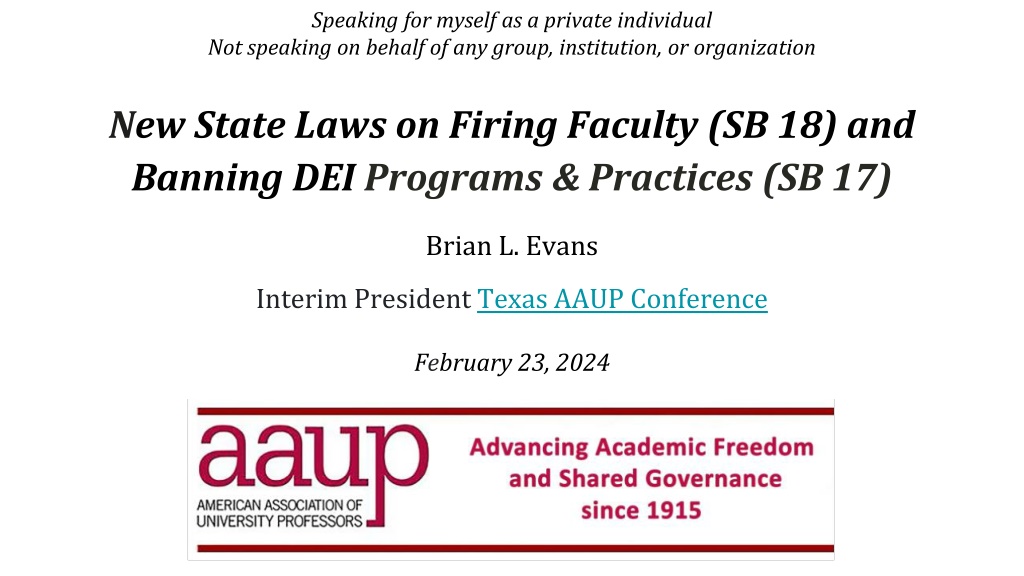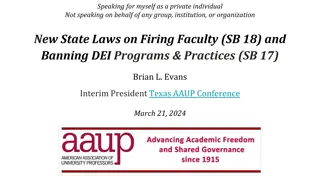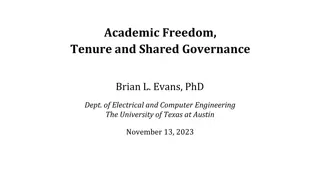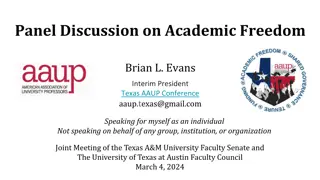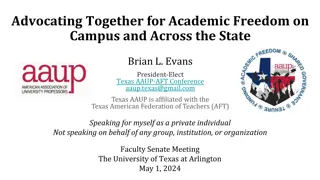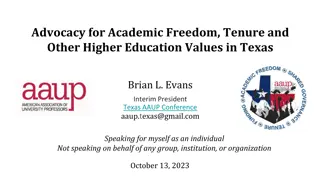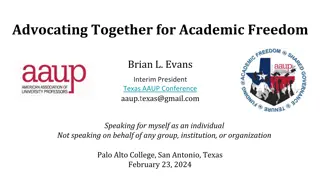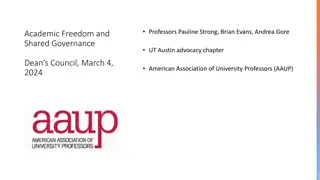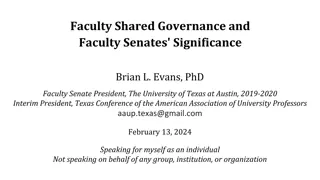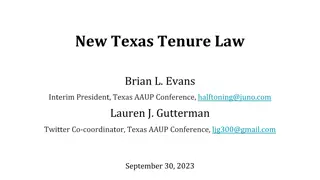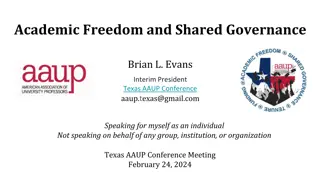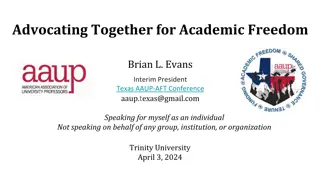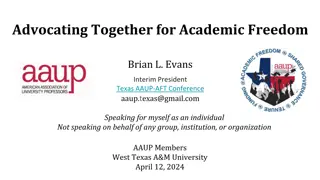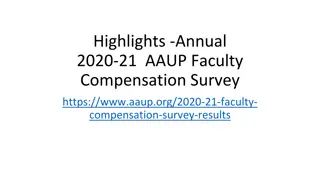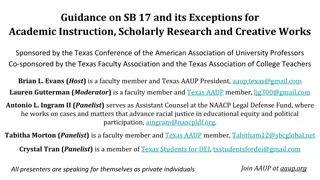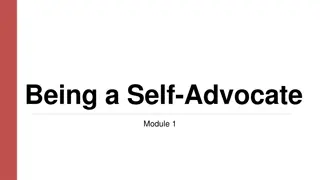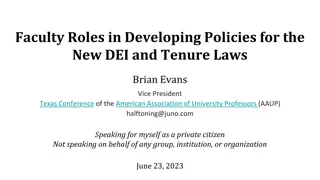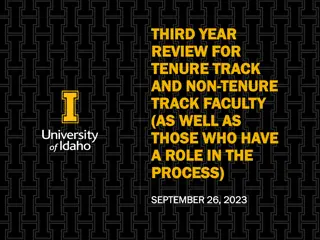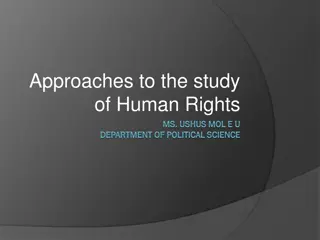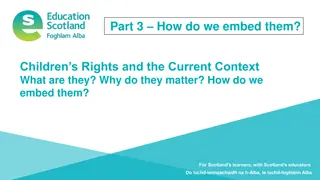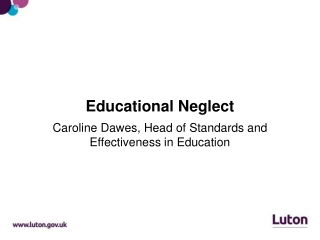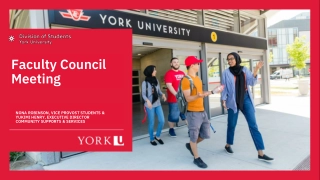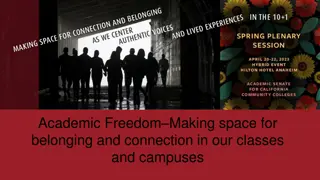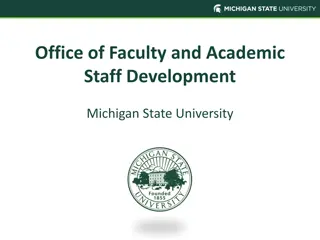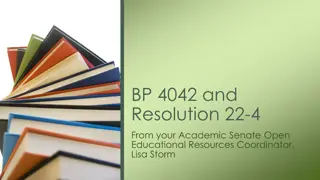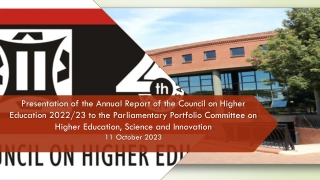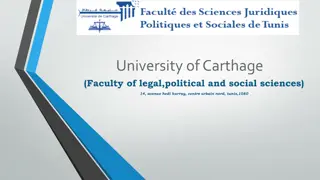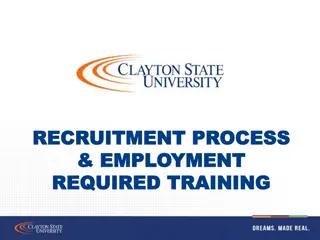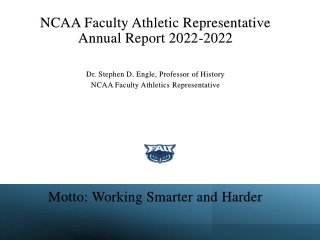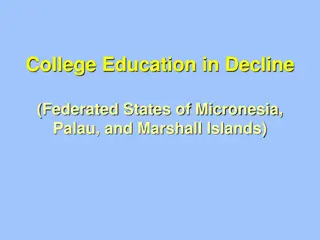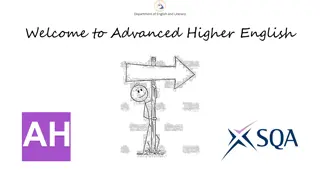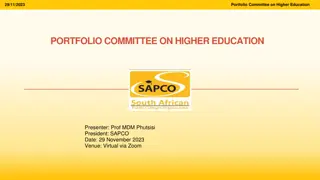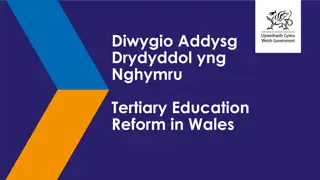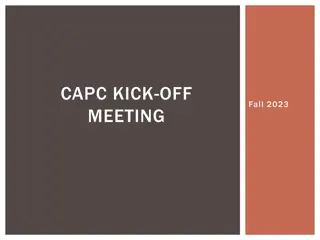Advocate for Academic Freedom and Faculty Rights in Texas Higher Education
Texas AAUP Conference, in collaboration with affiliated organizations, fought against new state laws targeting faculty members and diversity initiatives. Advocacy efforts led to legislative changes ensuring academic freedom, tenure protection, and exemptions for DEI programs. Academic freedom principles were upheld through joint initiatives with college and university leaders, emphasizing rights to discuss, research, and publish freely in educational settings. The coalition's success in opposing censorship and safeguarding faculty rights demonstrates the importance of unified advocacy in higher education.
Download Presentation

Please find below an Image/Link to download the presentation.
The content on the website is provided AS IS for your information and personal use only. It may not be sold, licensed, or shared on other websites without obtaining consent from the author. Download presentation by click this link. If you encounter any issues during the download, it is possible that the publisher has removed the file from their server.
E N D
Presentation Transcript
Speaking for myself as a private individual Not speaking on behalf of any group, institution, or organization New State Laws on Firing Faculty (SB 18) and Banning DEI Programs & Practices (SB 17) Brian L. Evans Interim President Texas AAUP Conference February 23, 2024
American Association of University Professors (AAUP) Founded in 1915 by faculty and has 45,000 members Champions academic freedom, advances shared governance, and organizes all faculty to promote economic security and quality education Develops standards and procedures to protect academic freedom and ensure shared governance adopted by more than 1500 colleges and universities. Welcomes faculty, researchers, grad students & academic advisors as members and others as associate members join at aaup.org. Affiliated with American Federation of Teachers (1.7M including 148,000 professors) on Aug. 1, 2022. Texas AFT has 66,000 members.
Texas AAUP Conference Members at 75 universities, comm. colleges, health-related inst. Advocacy amplified by Texas AFT & NAACP Legal Defense Fund In the House, our coordinated effort among 10 higher ed orgs to organize faculty, staff, students, alumni, and others Led to change in legal definition of tenure from one-year guaranteed contracts to continuous employment (SB 18) Led to changes in anti-DEI bill including several exceptions for external grants (SB 17) Helped defeat the censorship bill (SB 16) Karma R. Ch vez, Lessons from AAUP Advocacy in Texas, Academe, 2023. How a revived AAUP chapter and a coalition of allies mobilized against a legislative assault.
Academic Freedom In higher education, academic freedom lies at the heart of the free, independent, critical inquiry fundamental to the mission of a college or university Faculty in AAUP and college/university Presidents in American Association of Colleges & Universities jointly formulated academic freedom principles for teachers: [1] freedom to discuss all relevant matters in the classroom freedom to explore all avenues of scholarship, research, and creative expression and to publish the results of such work freedom from institutional censorship or discipline when speaking or writing as participants in the governance of an educational institution freedom from institutional censorship when speaking or writing as a citizen [1] 1940 Statement: https://www.aaup.org/report/1940-statement-principles-academic-freedom-and-tenure
Academic Freedom Academic freedom empowers faculty as well as other teachers and researchers to bring the latest breakthroughs into the classroom innovate in scholarly research and creative endeavors disseminate knowledge for the benefit of society Academic freedom allows teachers to help students develop the critical thinking, knowledge, training, and professional networks needed for successful careers Critical thinking is a required course outcome by THECB. [2] AAUP, Presidents, and Boards of Regents jointly formulated principles for shared governance and due process [3] which are key safeguards of academic freedom [2] Texas Higher Ed. Coordinating Board, Lower Division Academic Course Guide Manual, Spring 2018. [3] 1966 Joint Statement, https://www.aaup.org/report/statement-government-colleges-and-universities
SB18 Modified Post-Tenure Review in Education Code Part 1 Adds Tenure Definition Codifies tenure as continuous employment Sec. 2 Part 4 Only a governing board may grant tenure Sec. 3(b) Supreme Court held tenure as a property right property amount in Sec. 3(c) ** Part 2 Faculty dismissal with due process in Sec. 3(c-1) Each governing board shall adopt policies and procedures regarding tenure Defines 10 ways to dismiss a tenured faculty member Continues provisions for periodic post-tenure review processes Underlined text means text added to existing law Part 3 Summary ( Immediate ) Dismissal in Sec. 3(c-4) Sets minimum standards for institutions that choose to have summary dismissal ** 14th Amendment of the US Constitution: Government cannot deprive an individual of property or liberty without due process, but each State defines the property interest. 6
Concerns About SB 18 (1/2) Academic Freedom not mentioned Connect academic freedom as a necessary safeguard of academic freedom Academic freedom: freedom from censorship by the institution or government Other academic freedom safeguards include due process & shared governance Part 2: Seven reasons for termination are undefined or vague and many do not indicate severity or pervasiveness exhibited professional incompetence failed to perform duties or meet professional responsibilities engaged in conduct involving moral turpitude violated laws or university system or institution policies engaged in unprofessional conduct that adversely affects the institution violated university system or institution policies other good cause as defined in the institution s policies 7
Concerns About SB 18 (2/2) Part 2: Additional grounds for termination in Sec. 3(c-1) include Failure to complete a development plan from post-tenure review other good cause as defined in the institution s policies Part 3: Lack of due process protections for summary dismissal in Sec. 3(c-4) A designated administrator is the sole arbiter in determining the outcome instead of a jury of one s peers Does not give faculty opportunity to examine evidence or talk to witnesses Does not provide faculty the option for legal representation Allows a faculty grievance process only after termination 8
SB17 Bans DEI Programs and Practices (1/3) Defines a diversity, equity, and inclusion (DEI) office per Sec. 1(a) Influencing hiring or employment practices w/r to race, color, ethnicity or sex Promoting differential treatment to individuals on basis of race, color, or ethnicity Promoting policies or procedures w/r to race, color, or ethnicity Conducting trainings, programs, or other activities designed or implemented in reference to race, color, ethnicity, gender identity, or sexual orientation Bans per Sec. 1(b) DEI offices, officers, programs, practices, and trainings Requirement of, or providing preferential treatment for, a DEI statement Preference on basis of race, sex, color, ethnicity, or national origin to an applicant for employment, an employee, or a participant in any function of institution An employee or third party from performing the duties of a DEI office
SB17 Bans DEI Programs and Practices (2/3) Exceptions to ban in Sec 1(d): Academic course instruction Scholarly research or a creative work Student organizations Guest speakers Enhance student academic achievement or postgraduate outcomes that is designed and implemented without regard to race, sex, color, or ethnicity Data collection Student recruitment or admissions When applying for grants or complying with terms for accreditation Can submit a statement highlighting the institution s work in supporting first- generation, low-income, and underserved student populations, per Sec 1(c)
SB17 Bans DEI Programs and Practices (3/3) Penalties for faculty, staff, and contractors per Sec 1(b)(2) Discipline is up to and including termination for any employee or contractor who engages in conduct banned on slide 6 Policies and procedures developed by each Governing Board Institutional compliance and penalties per Sec. 1(e) and 1(h) Institution may not spend State funds each year until Governing Board certifies compliance If a state auditor finds an institution out of compliance, the institution has 180 days to cure the violation If an institution does not get into compliance, institution will lose formula funding increases, institutional enhancements, or exceptional items in the next biennium Student or employee may sue if required to participate in DEI training: Sec. 1(i)
SB17 Key Takeaways Don t do the censors work for them Jeremy C. Young, PEN America SB 17 does not affect course instruction, scholarly research, or creative works! We can and should continue to teach and research about racism, inequality, LGBTQ+ issues, and DEI itself. You should not censor yourself by avoiding teaching material that could be controversial. By doing so we make instructors who cannot avoid these subjects MORE vulnerable. You might consider reminding students at the beginning of the semester that SB 17 does not affect what they can talk or learn about in class. Sample syllabus rider: Texas Senate Bill 17, the recent law that outlaws diversity, equity, and inclusion programs at public colleges and universities in Texas, does not in any way affect content, instruction or discussion in a course at public colleges and universities in Texas. Expectations and academic freedom for teaching and class discussion have not been altered post-SB 17, and students should not feel the need to censor their speech pertaining to topics including race and racism, structural inequality, LGBTQ+ issues, or diversity, equity, and inclusion.
Todays Panelists Avatara Carrington is a Civil Rights Attorney at the NAACP Legal Defense Fund, acarrington@naacpldf.org Jim Klein is a faculty member, and Past President of the Texas AAUP and the Texas Association of College Teachers, jeklein20@gmail.com. Panel moderator. Andrew Martin is a faculty member, and President, Texas Tech AAUP Chapter, andrewwmartin@hotmail.com Tabitha Morton is a faculty member, and Member, Prairie View A&M AAUP Chapter, Tabitham12@sbcglobal.net Aimee Villareal is a faculty member a Texas State University and an AAUP Member, aimvilla@gmail.com All presenters are speaking for themselves as private individuals
